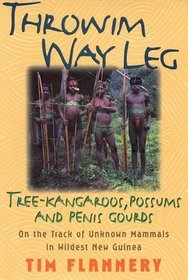OK, admit it - it isn't tree kangaroos or possums in the title that caught your eye.
From Amazon:
In Throwim Way Leg, Australia-based mammologist-raconteur Tim Flannery recalls scientific expeditions in the wilds of New Guinea that convey both the thrill of discovery and the negotiations necessary to bridge huge clashes of cultures. A world expert on New Guinea's fauna, Flannery has discovered 20 new species during his two decades of research. Yet his ability to convey unalloyed adventure in his taletelling makes these scientific expeditions read more like hair-raising, funky Redmond O'Hanlon-style travels than disciplined, scholarly field trips. Energy and danger run high.
Terrific thunderstorms and aircraft mishaps rattle Flannery during his travels. Yet the most memorable quality of Throwim Way Leg is Flannery's incorporation of humans into the natural world he writes about, often contrasting the jungled New Guinea denizens with stark modern technologies. He writes rich profiles of those he has met, and his images are memorable and meaningful: crowds of people gaping at a single television set; the remote landscape of Mt. Albert Edward dotted with cattle, Swiss chalets, and the smoky fires of the Goilala people; the malnourished Yapsiei greeting him reeking of the "sweet, sickly smell" of grile, a form of ringworm.
Ultimately, Flannery looks ahead and sees that the age of discovery is not at all complete in New Guinea, as so much remains unknown. But, in an often-told tale, modern political forces are at work, reshaping those unique natural and cultural environments that Throwim Way Leg explores with such vigor.
In Throwim Way Leg, Australia-based mammologist-raconteur Tim Flannery recalls scientific expeditions in the wilds of New Guinea that convey both the thrill of discovery and the negotiations necessary to bridge huge clashes of cultures. A world expert on New Guinea's fauna, Flannery has discovered 20 new species during his two decades of research. Yet his ability to convey unalloyed adventure in his taletelling makes these scientific expeditions read more like hair-raising, funky Redmond O'Hanlon-style travels than disciplined, scholarly field trips. Energy and danger run high.
Terrific thunderstorms and aircraft mishaps rattle Flannery during his travels. Yet the most memorable quality of Throwim Way Leg is Flannery's incorporation of humans into the natural world he writes about, often contrasting the jungled New Guinea denizens with stark modern technologies. He writes rich profiles of those he has met, and his images are memorable and meaningful: crowds of people gaping at a single television set; the remote landscape of Mt. Albert Edward dotted with cattle, Swiss chalets, and the smoky fires of the Goilala people; the malnourished Yapsiei greeting him reeking of the "sweet, sickly smell" of grile, a form of ringworm.
Ultimately, Flannery looks ahead and sees that the age of discovery is not at all complete in New Guinea, as so much remains unknown. But, in an often-told tale, modern political forces are at work, reshaping those unique natural and cultural environments that Throwim Way Leg explores with such vigor.




